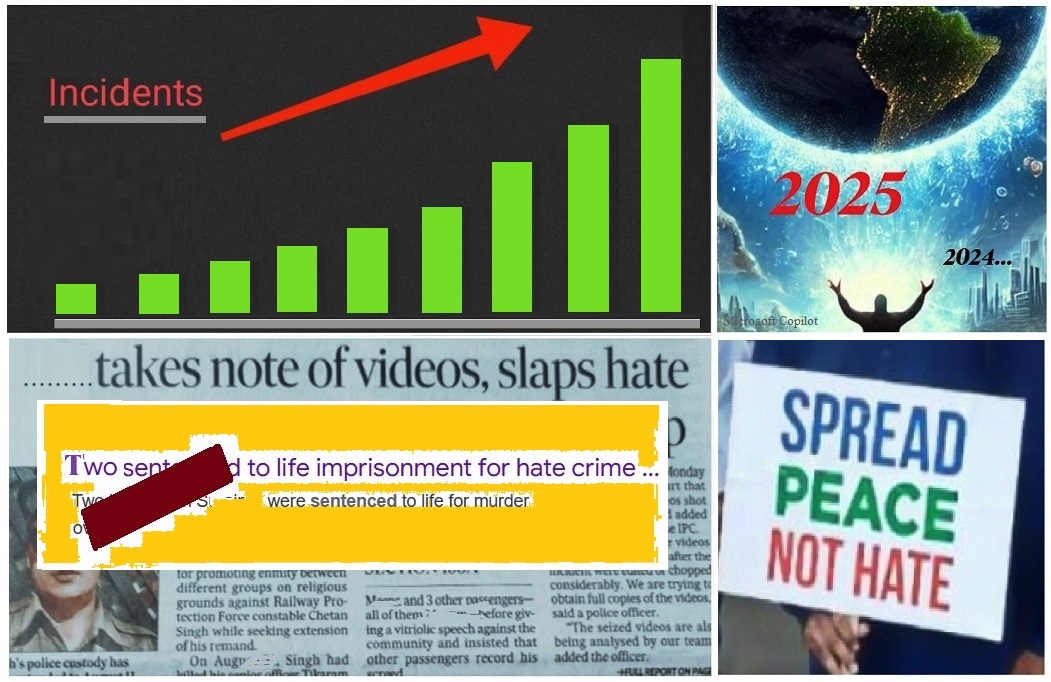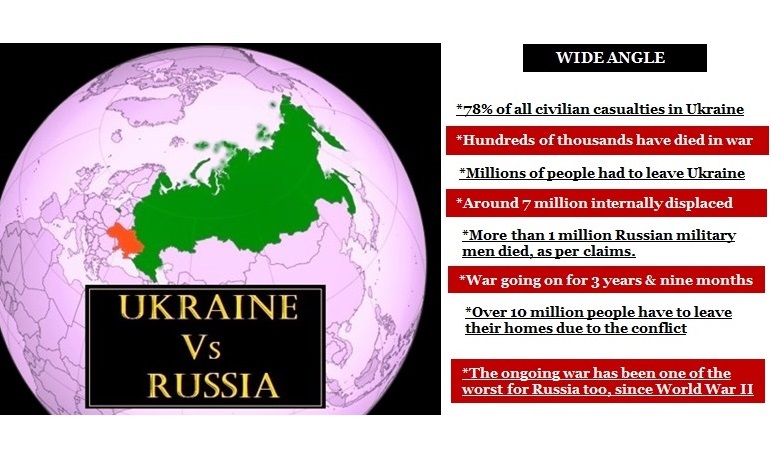Asad Mirza
An impartial review of the year 2024 makes it clear that hate has become an essential component in society. Goons hell-bent on dividing society and make constant attacks, attempts to vilify the minorities, had a free run.
Worse, leaders were not concerned or apologetic about the false and hateful narrative created for selfish gains. In fact, like previous years, 2024 was no different as bigotry rose.
In India, it was election year & many thought that minorities might get a respite from hate crimes and speeches. But this didn’t happen.
In the months leading to general elections, a vicious and one sided campaign was orchestrated by the right-wing elements with the apparent silent support of certain sections of bureaucracy.
In 2024, five states –Assam, HP, Uttarakhand, Jharkhand & UP were virtually turned into labs to harass the religious minorities. It seemed as if the script to unsettle & target religious minorities was written and task to deliver was given over to lesser-known right-wing outfits on the ground.
Controversy was raised in Himachal Pradesh’s capital Shimla, against a mosque, terming it an encroachment, even though the mosque committee had all the relevant documents to prove the ownership and sanctions by the concerned authorities to add additional floors to the mosque. But when state power is usurped by elements then who cares to listen to the evidence and advice?
This concerted action led to their ostracism further, when Muslims were asked to leave different localities in several towns and cities of the state. At the same lines, a doctor was asked to cancel the sale of their house to a Muslim couple, in Moradabad-UP, as the locals claimed that this sale will vitiate the atmosphere of the colony.
The same script was played again in New Delhi, when several old mosques and graveyards were served notices alleging that these were illegal encroachment, and in spite of clear judicial orders, the ‘bulldozer justice’ was exercised by local authorities.
People were not ready to stop the local administration’s activities, when such activities were taking place in the national capital. As if the replay of the old scripts was not enough, the central government brought in a constitutional amendment bill to manage the Waqf properties of the Muslim community.
All this went on, though such properties were donated by Muslims themselves for the welfare of the community. A false narrative was created, utilising WhatsApp and other social media platforms to spread canards against the Muslim community and Waqf properties.
Another face of the right-wing politics taking firm roots in the political landscape of the country was evident when different political parties announced their candidates for the Lok Sabha elections. Though, the BJP’ avoids fielding Muslim candidates, even the supposedly secular parties were not ready to give tickets to Muslim candidates.
The result was glaring when the eighteenth Lok Sabha got constituted with such a low share of Muslim MPs in the last six decades. Less than 5% of members are Muslims despite people from the community forming nearly 15% of the country’s population. There are currently 24 Muslim MPs (4.4%) in the Lok Sabha.
The party with the most elected members in 2024, Bharatiya Janata Party (BJP), has no representatives from the Muslim community currently. In fact, the decline in the share of the Muslim MPs in the Lok Sabha, in the 1990s, coincided with the rise of the BJP, whose total MP tally crossed the 100-mark for the first time in the 10th Lok Sabha (1991-96).
Moreover, during the election campaign, top leaders seldom talked about development programmes, reflected in jumlas, but chose to spoke on completely fabricated charges against the country’s Muslim community and the opposition, viz, a weird claim that if the Congress party came to power, it would distribute the country’s wealth among Muslims.
People were told that other party would take away their possessions – such as the bridal necklaces, or mangalsutra – of Hindu women and give it to its “vote bank” i.e. the Muslims. There was also claim that the opposition Congress party was planning to take away job reservations from Scheduled Castes, Scheduled Tribes and Other Backward Classes (OBCs) and give them to Muslims; additionally it was said that the opposition alliance is asking Muslims to do ‘vote jihad’.
It was wishfully or rather erroneously expected that after BJP’s return to power, the hate speeches and hate campaign against the religious minorities would come down, but again the hopes were belied. In just two months i.e. August and September 2024, there were 135 violent attacks on the religious minorities and close to 68 hate speeches were delivered against them.
In the second half of the year, the right-wing elements found another ploy to harass the Muslims. They initiated a campaign alleging that hundreds of mosques across the country including the ones at Varanasi, Mathura and others have been built on demolished temples and urged the courts to order excavation of these mosques. The worst result of this canard was evident in Sambhal – UP, where the police action against the local Muslims demonstrating against the excavation of the local Jama Masjid, resulted in death of several Muslim youth.
An end to this insane campaign was laid when Supreme Court in its order on December 12, directed courts across the country not to entertain or pass orders in any new suits or pleas seeking surveys of mosques to determine whether temples exist beneath them. The court further restrained lower courts from passing any orders in existing suits concerning such disputes, effectively putting a freeze on surveys pending further directions.
But it remains to be seen how long the restrain may continue, as Apex court in April 2023 and earlier in October 2022 had urged the relevant authorities to take Suo Motu action against the culprits who indulge in hate speeches & file FIRs against the culprits. Yet, despite these orders, hate Speeches continued during the election campaigns and at a conservative estimate, around 200 hate speeches were delivered by the right-wing leaders in 2024 alone.
It was not as if this treatment was reserved just for Muslims, according to a report by the United Christian Forum, 745 cases of hate and violence were committed against the country’s Christian community by right-wing Hindu activists, across India.
At the fag-end of the year, on the occasion of Christmas, several incidents of right-wing elements’ protest or ruckus were reported. Overall, it seems that hate has been able to entrench itself in the political ecosystem and until and unless a cohesive action plan is not put in motion by the Centre, nothing better could be expected even in 2025, as it seems that hate has become the fate accompli of the country’s religious minorities, in order to further a polarizing and divisive political agenda.
—–
[Asad Mirza is a New Delhi-based senior commentator on national, international, defence and strategic affairs, environmental issues]




